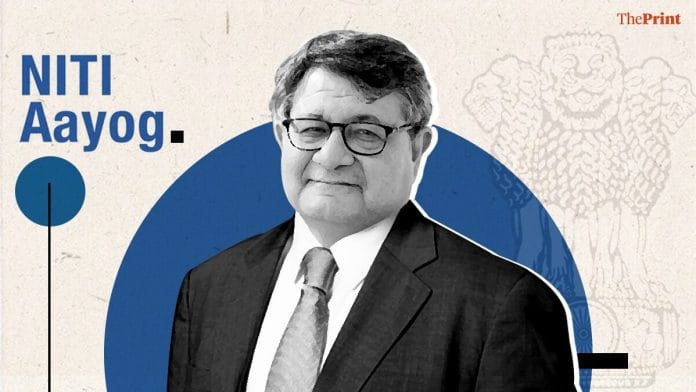New Delhi: The Modi government’s public policy think-tank NITI Aayog will have a new vice-chairman from 1 May, when economist Suman K. Bery takes over from Rajiv Kumar.
Kumar, who replaced Arvind Panagariya in August 2017 when the latter decided to return to academics, announced his resignation Friday.
Delhi | Dr. Suman K Bery, Vice Chairman designate, NITI Aayog takes charge as a full-time member of NITI Aayog.
He took charge in the presence of NITI Aayog CEO Amitabh Kant and Member Dr. VK Paul. pic.twitter.com/zIZG7S3ovc
— ANI (@ANI) April 23, 2022
Dr Suman K Bery appointed as Vice-Chairman of the NITI Aayog after Dr Rajiv Kumar stepped down from his post. pic.twitter.com/6vQ9HWUSNJ
— ANI (@ANI) April 22, 2022
A graduate of politics, philosophy, and economics of Magdalene College at the University of Oxford, Bery worked at the World Bank for 28 years from 1972 to 2000 in various capacities, including as an economist in its Public Finance Division and as division chief, economic adviser, and lead economist for the World Bank’s operations in Latin America.
From 1992-1994 — the age of India’s liberalisation — Bery worked as a special consultant to the Reserve Bank of India in Bombay while he was on leave from the World Bank.
On his return to India in 2001, Bery joined National Council for Applied Economic Research (NCAER), a New Delhi-based non-profit think tank focused on economics, as director-general — a position he served until 2011.
“[Dr. Bery] is a very good macroeconomist,” says economist Ila Patnaik. “We have remained in touch over the years and did not just work together at NCAER, but on many other things as well.”
He has also been a member of the Prime Minister’s Economic Advisory Council, RBI’s Technical Advisory Committee, and the National Statistical Commission.
Suman Bery was chief economist of Shell International, based in The Hague, The Netherlands, from early 2012 till mid-2016, has been a non-resident fellow at the Brussels-based economics think-tank Bruegel and a Senior Fellow of the Mastercard Centre for Inclusive Growth.
“[Dr. Bery] advised the board and management of Royal Dutch Shell on global economic and political developments,” India Today reported about his tenure at Shell. “He also was part of the senior leadership of Shell’s global scenarios group. While at Shell, he led a collaborative project with Indian think tanks to apply scenario modelling to India’s energy sector.”
He also wrote regularly for Business Standard from 2003 until 2020, publishing columns and opinion pieces about economic and monetary policies within India and globally.
Also Read: Gujarat, Kerala & Punjab top 3 performers in Niti Aayog’s new energy & climate index
Critical of G20
One of the issues on which Dr. Bery has written extensively about is the role of the G-20 in shaping global economic policy. In 2018, he argued for “enhanced dialogue and cooperation between India and China on global challenges” in line with the overall goal of “sustaining global growth”.
“Reform of the G20’s own processes is required in order to create a better balance between resources consumed and economic impact,” he wrote in the column.
A few years later in October 2021, he was critical of the G20 for its economic response to the impact of the Covid-19 pandemic and over its failure to aid the world’s poorest nations.
“Economic recovery is highly contingent on access to vaccines,” he wrote for Bruegel, in a piece co-authored with research analyst Pauline Weil. “Although the G20 has reasserted some commitments to ensuring global vaccine access, including in the October 2021 review of the Action Plan, it has so far come short of avoiding big discrepancies in vaccination rates. The G20 is the right platform to address the persistent shortcomings in addressing health crisis in poorer countries. The next G20 chairs will be Indonesia (2022) and India (2023). They should exercise diplomacy in support of global solidarity, not just on climate but across the board.”
Bery has also written on the importance of India’s economic diplomacy in the near future, and the role played by multilateralism. “The world has moved on from multilateral institutions to engagement occurring bilaterally among sovereigns,” Business Standard quoted him as saying in one of his columns. “As noted, India has long had a seat at the top table. As 2022 approaches, we will need to decide what to order from the menu.”
(Edited by Uttara Ramaswamy)
Also Read: Niti Aayog at 6 — some ideas too ‘ambitious’ but Modi think tank has many reforms up its sleeve






